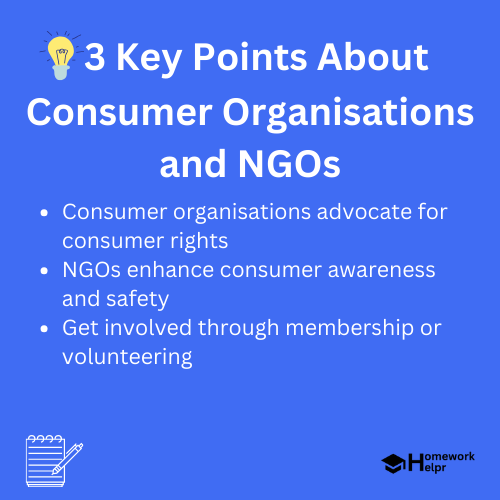📝 Summary
Consumer organisations and NGOs are essential in protecting consumer rights and advocating for fair practices. These non-profit entities educate consumers about their rights, lobby for legislation changes, and provide support for issues related to products and services. Jointly, they enhance consumer awareness, empower informed choices, and drive improvements in regulations. Their persistent efforts address significant challenges such as funding and consumer awareness, creating a safer environment for consumers. Getting involved in these organisations can amplify their impact and support vital advocacy for consumer protection.
Consumer Organisations and NGOs
In today’s world, understanding our rights as consumers is crucial. Consumer organisations and non-governmental organisations (NGOs) play a vital role in safeguarding these rights. They advocate for fair practices and provide essential support to individuals facing issues with products and services. But what exactly are these organisations, and how do they benefit society? Let’s dive deeper.
What are Consumer Organisations?
Consumer organisations are non-profit entities that aim to protect the interests of consumers. They focus on ensuring that consumers are informed about their rights and are treated fairly in the marketplace. These organisations often work to advocate for changes in legislation and industry practices that affect consumers. They provide a range of services, including education, support, and representation.

Functions of Consumer Organisations
Consumer organisations have several important functions that help maintain a balanced market. These include:
- Awareness Campaigns: Conducting education programs to inform consumers about their rights.
- Advocacy: Lobbying for stronger laws and regulations that protect consumers.
- Consumer Support: Providing assistance to consumers who have complaints or issues with products or services.
- Research: Conducting studies and surveys to understand consumer needs and market trends.
Definition
1. Advocacy: The act of pleading for, supporting, or recommending a cause or policy. 2. Legislation: The process of making or enacting laws.
Examples
For example, if a product is found to be unsafe, consumer organisations will bring this issue to the attention of both the public and the relevant authorities to ensure consumer safety.
What are NGOs?
NGOs, or non-governmental organisations, are typically non-profit groups that operate independently from government control. They focus on a variety of issues, including social justice, environment, health, and education. NGOs are crucial in addressing gaps in government services and advocating for vulnerable populations.
❓Did You Know?
The term “NGO” was first coined in 1945 by the United Nations to describe any non-state actor that was not a member of the government.
Role of NGOs in Consumer Protection
NGOs play an essential role in advocating for consumer rights. They work hand-in-hand with consumer organisations to further enhance the protection and awareness of consumer rights. Their functions often include:
- Research and Education: NGOs often conduct studies on consumer issues and disseminate findings to the public.
- Legal Support: Some NGOs provide legal assistance to consumers facing unfair trade practices.
- Policy Advocacy: They lobby for policies that fair trade practices and protect consumer rights.
Examples
An example of an NGO’s work could be an environmental NGO that advocates against plastic use. They might conduct workshops on the impact of plastic and promote alternatives among consumers.
Impact of Consumer Organisations and NGOs
The impact of consumer organisations and NGOs can be seen in many areas of consumer rights and safety. Their persistent efforts lead to:
- Improved Regulations: Stricter laws to protect consumers from fraud and unsafe products.
- Consumer Awareness: Higher levels of awareness among consumers regarding their rights and responsibilities.
- Empowerment: Equipping consumers with knowledge that enables them to make informed choices.
Challenges Faced by Consumer Organisations and NGOs
Despite their significant contributions, consumer organisations and NGOs face several challenges:
- Funding: Many NGOs struggle with securing funding to sustain their operations.
- Awareness: Some consumers are still unaware of the existence and functions of these organisations.
- Resistance: Business interests may resist regulations advocated by these organisations.
Definition
1. Empowerment: To give someone the authority or power to do something. 2. Fraud: Wrongful or criminal deception intended to result in financial or personal gain.
How Can You Get Involved?
Getting involved with consumer organisations and NGOs can be satisfying and impactful. Here are ways you can contribute:
- Membership: Join consumer organisations to stay informed and contribute to advocacy.
- Volunteering: Offer your time and skills to help NGOs with their programs and activities.
- Awareness Campaigns: Participate in and promote campaigns organized by these organisations.
Examples
For instance, joining a local consumer group can help you connect with like-minded individuals who are also passionate about consumer rights.
Conclusion
Consumer organisations and NGOs play a pivotal role in today’s marketplace, providing a shield against unfair practices and ensuring that consumer rights are not only recognized but also protected. Their valuable initiatives help educate the public, advocate for necessary changes, and ultimately create a safer consumer environment. By staying informed and getting involved, you too can contribute to this essential cause and make informed choices as a consumer.
Related Questions on Consumer Organisations and NGOs
What are consumer organisations?
Answer: Non-profit entities protecting consumer interests.
What roles do NGOs play in consumer protection?
Answer: NGOs advocate, educate, and provide legal support.
What challenges do these organisations face?
Answer: Funding, consumer awareness, and resistance from businesses.
How can individuals contribute?
Answer: Join, volunteer, and participate in awareness campaigns.
